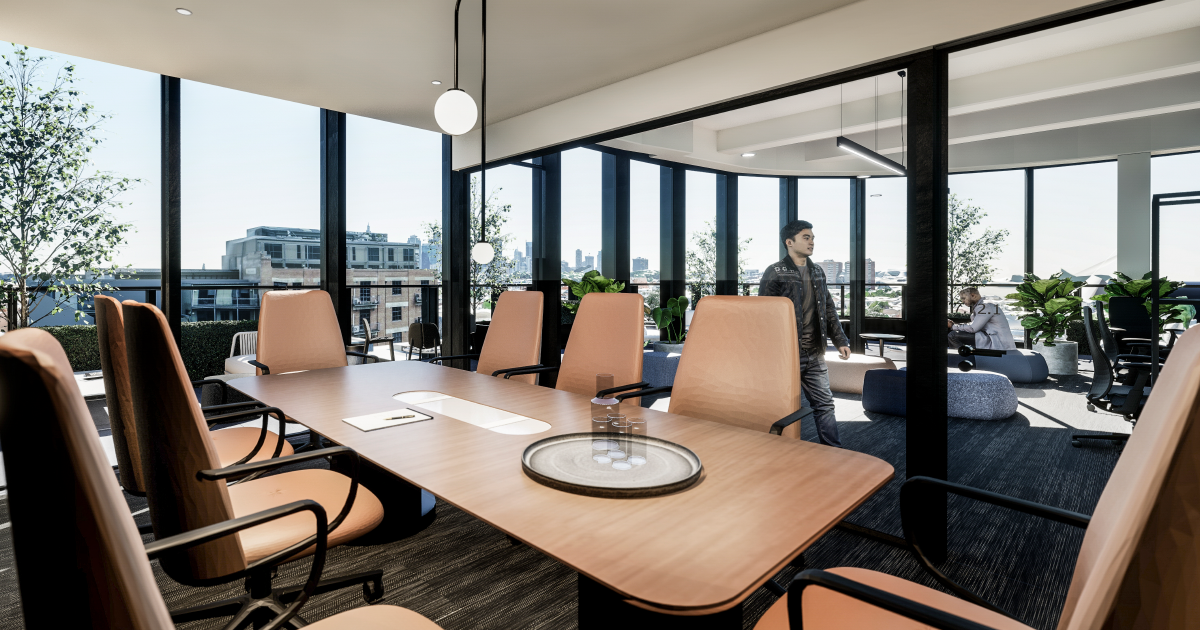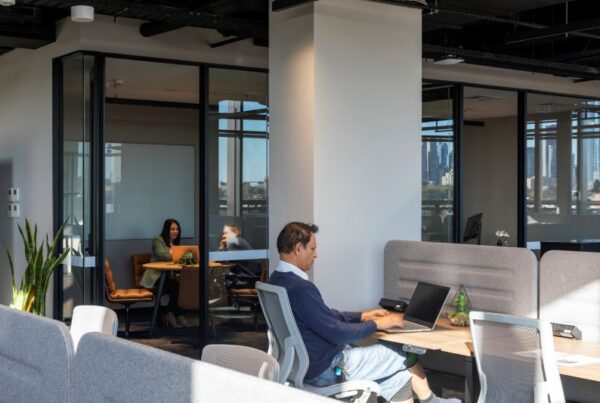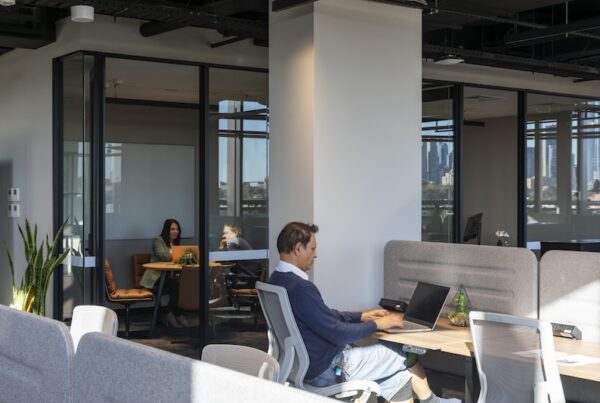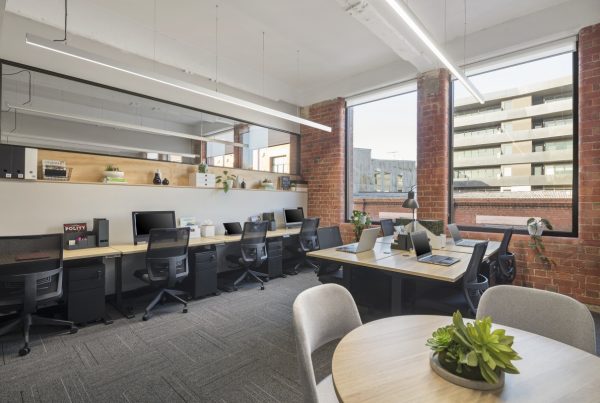
A business office space refers to a commercial property available for rent to businesses or individuals for conducting office-related activities. This includes a designated area within a building or complex, offering a working environment with amenities such as desks, chairs, and an internet connection. In addition, shared facilities like conference rooms, kitchens, or parking spaces may be included.
Moreover, leasing space in a business office allows tenants to establish a professional presence without the long-term commitment and financial investment associated with purchasing a property. Here, we examine the benefits of leasing a flexible business office space and how it can maximize your growth opportunities.
Who can lease a flexible business office space?
Various groups and individuals can rent a flexible business offices space, including:
-
Small and medium-sized businesses
Companies that need physical offices to carry out their operations and accommodate their employees often lease office spaces. This includes small companies, professional service firms, creative companies, tech companies, and more.
-
Freelancers and independent professionals
Individuals who work independently or as freelancers may choose to lease a casual or private office to separate their work from their personal life, gain access to amenities, and create a more professional environment.
-
Remote teams and satellite offices
Organizations with remote teams or those looking to find somewhere to establish a satellite office in a different location may opt to rent office spaces to provide a main working space for their employees.
-
Branches and subsidiary companies
Companies growing their operations or establishing branches or subsidiaries in new areas may lease or rent out office spaces to set up a first level of physical presence and support local operations.
-
Non-profit organizations
Non-profit organizations often rent offices to manage their administrative tasks, coordinate events, and cater for collaborations.
-
Professional service providers
Lawyers, financial advisers, consultants, and other professionals who offer services to clients often rent private office spaces to meet with clients, conduct meetings, and maintain a professional image.
It is important to note that the specific needs of leasing offices can vary due to the nature of the business or individual needs.
Why should you consider a flexible business office space?
There are several reasons why individuals or businesses choose to lease offices. Flexible office leasing can be helpful for many reasons, and many can often choose between casual office spaces or private offices.
-
Flexibility
Leasing an office provides flexibility in terms of the duration of use. Lease terms can be suited to address short-term or long-term needs, allowing businesses to adapt to changing circumstances or easily relocate if necessary.
-
Cost-effectiveness
Leasing an office often requires a lower upfront financial investment compared to buying a property. It allows businesses to allocate their capital to other essential areas such as operations, marketing, or hiring.
-
Access to amenities and services
Many leased offices come equipped with amenities and services such as internet connectivity, utilities, maintenance, and security. These shared resources are often more cost-effective than setting them up independently.
-
Professional image
Having a front lobby or dedicated office space can enhance a company’s professional image and credibility. It provides a formal environment for meetings with clients, partners, and employees, giving the impression of stability and reliability.
-
Networking
Leased offices often house multiple businesses, offices, or professionals located in the same building, floor, or complex. This can lead to networking, collaboration, and potential business partnerships.
-
Location advantages
Leasing offices allows businesses to establish a presence in desirable locations or find offices that may be otherwise unaffordable or inaccessible for purchasing. To rent a new office and find a space in a prime location, can attract clients, and employees, and contribute to the overall success of the business.
-
Focus on core activities
By leasing an office, businesses can decide the responsibility of property management and upkeep of private offices to the owner or property management company. This allows the business to focus more time on its core activities and everyday operations.
Each business or individual needs to evaluate and address their specific needs and circumstances to determine if leasing an office aligns with their goals and budget.
How long are most office leasing agreements?
The duration of office space for lease can vary depending on the lease level-specific agreement between the landlord and tenant. However, when it comes to offices and leasing, some common agreement terms are often seen in the commercial real estate industry, in Melbourne.
Typically, office leasing can range from as short as one year to as long as ten years or more. The most common lease terms for offices are usually between three to five years, depending on the office spaces required. Private office space is a popular option.
Short-term office leasing, such as those with a duration of one to two years, offers greater flexibility to tenants who may have uncertain or ever-changing space requirements. These shorter leases are often preferred by startups, small businesses, or those who are testing a new market or concept.
Moreover, long-term leases, on the other hand, provide stability and security for both the landlord and tenant. They are commonly chosen by established businesses looking for a stable location and the potential for cost savings through agreed rates.
In addition to offering the initial term, some agreements may include options for renewal or expansion, allowing tenants to extend their terms or increase their space as their needs evolve.
It’s worth noting that office and leasing terms can be negotiated between the parties involved, and the specific terms and conditions of office terms can vary widely depending on factors such as market conditions, location, property type, and individual circumstances.
How to find the right Melbourne Office Space to Lease
The benefit of flexible business office space for your growth opportunities
Here are some benefits of a flexible business office space for your growing company.
-
Scalability
Office leasing allows businesses to scale their operations as they grow. They can start with small offices and expand as needed to private offices, without the constraints of property ownership. This type of flexibility allows businesses to adapt to changing demands. It also accommodates a growing number of employees.
-
Professional Image
An empty private office provides a professional environment for conducting business activities, meeting clients, and hosting meetings. A well-maintained and properly equipped private office can enhance a business’s image, reputation, and professionalism. This can be great for attracting clients, partners, and top talent.
-
Centralized Operations
Office leasing provides a centralized location for a team of employees to work together, fostering collaboration, communication, and connectivity. This can lead to better productivity and efficiency, especially for businesses that rely on in-person interactions or need a physical space for certain operations.
-
Access to Amenities and Services
Many leased offices and spaces come with shared amenities and services, such as reception areas, meeting rooms, kitchen appliances, and parking. These resources are often cost-effective compared to setting them up independently. Access to this can improve the overall convenience of the workspace.
-
Networking Opportunities
Leased office spaces often house multiple businesses or professionals within the same building or complex. This proximity can facilitate networking opportunities, collaboration, and potential partnerships. Interacting with other tenants or businesses in the same location can lead to valuable connections, knowledge sharing, and business growth opportunities.
-
Prime Location
Office leasing allows businesses to establish a presence in sought-after locations that may be otherwise unaffordable or inaccessible for property ownership. New office space in a prime area can enhance visibility, accessibility, and the perception of the business, which can help its growth and success.
-
Cost Effective
Leasing an office generally requires a lower level of upfront investment compared to buying a property. It allows businesses to allocate their financial resources to other critical areas, such as marketing, hiring, or product development. Additionally, office leasing often offers predictable monthly bills, as the costs of property maintenance and repairs are the responsibility of the landlord.
It’s important for companies to carefully consider their specific needs, growth plans, and financial situation when deciding to lease an office building. Conducting thorough research, evaluating agreements, and considering future needs can help businesses make informed decisions that support their goals.
Read More About 5 Ways Your Business Will Benefit from Serviced Offices
What should I look for in a business office space?
When searching for an office space for lease, there are several factors to consider. Here are some key aspects to look for when it comes to office leasing:
-
Location of office space for lease
Evaluate the location’s accessibility, distance to transport, amenities, and suitability for your business needs. Consider a variety of factors such as the target market, competition, and convenience for employees and clients.
-
Size and Layout
Assess the size of the office and its layout to ensure it can work for your current and future needs. Consider factors like the number of employees, workspace requirements, meeting rooms, storage areas, and any infrastructure or equipment you may require for your offices.
-
Lease Terms and Flexibility
Carefully review the agreement, including lease duration, renewal options, rental rates, and any extra costs or obligations. Look for flexibility in case your business needs change during the overall term.
-
Amenities and Services
Consider the available amenities and services such as parking facilities, internet connectivity, security systems, maintenance support, shared common areas, and access to conference rooms or other facilities that may be crucial for your operations.
-
Infrastructure and Technology
Evaluate the infrastructure of the office, including electrical, HVAC systems, and IT infrastructure. Ensure that the new office area can accommodate your tech requirements and support efficient and dependable operations.
-
Safety and Security
Assess the full level of safety measures and security features of the building or complex, such as surveillance systems, access controls, fire safety, and emergency procedures. It’s important to prioritize the well-being of your employees and assets.
-
Scalability and Growth Potential
Consider whether the office allows for future expansion or flexibility to adjust the floor space according to your business growth. This can help avoid the need for frequent relocations and disruptions.
-
Parking and Accessibility of office space for lease
Assess the availability of parking spaces for employees and visitors. Consider accessibility for individuals with disabilities and the convenience of public transportation options.
-
Budget and Financial Considerations
Furthermore, determine whether the office leasing fits within your budget and consider any additional costs such as utilities, maintenance fees, and taxes. Ensure that the financial commitment aligns with your business’s financial capabilities.
-
Reputation and Landlord/Property Management
Research the reputation of the landlord or property management company. Read reviews or talk to current tenants to gauge their responsiveness, reliability, and level of support.
Above all, by considering these factors, you can make an informed decision about finding one that aligns with your business’s needs, goals, and budget. It’s often helpful to visit multiple potential office spaces, ask questions, and seek professional advice when necessary.
Read More about the Top Key Considerations for Finding Commercial Properties to Lease
Business Office Space For Lease At United Co. Melbourne
Looking for A-Grade office suites in Melbourne?
United Co. provides flexible workspace with dedicated meeting rooms and office suites with hotel-style services and amenities. We offer flexible options for companies looking for an office that offers them their workspaces with dedicated amenities as well as the dynamic of a shared space.
Get in touch today to enquire about office space for lease at United Co. in Melbourne.




